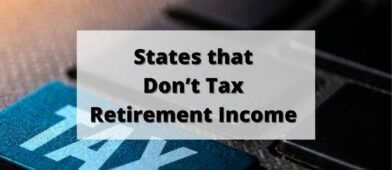You can file your tax returns for free if you have a simple tax situation. That includes W-2 income up to a certain dollar amount and limited interest and dividend income. If you exceed the limits or have more a more complicated income and expense situation, you will likely need to pay a fee for the service.
Before we explore the different free tax filing options, remember that if you’ve failed to file the previous year’s tax returns, your situation has already been complicated by the delay.
For many, the best strategy will be to pay a professional tax preparer to ensure your taxes are filed accurately and in a timely fashion.
With that in mind, here are some free tax filing options.
Table of Contents
- FreeTaxUSA
- TaxSlayer
- E-File.com
- File Manually
- What About TurboTax, H&R Block, and Cash App Tax?
- What Happens if You Can’t Pay Your Back Taxes
- Reasons Taxpayers Don’t File Their Returns
- 7 Reasons to File Back Taxes
- 1. To prevent the IRS from filing for you
- 2. To minimize the damage caused by not filing
- 3. You may be entitled to a refund
- 4. You want to receive certain government benefits
- 5. You want to borrow money
- 6. To pay self-employment taxes
- 7. To clear your conscience
- FAQs
- Bottom Line
FreeTaxUSA
As the name implies, FreeTaxUSA is a free tax-preparation software service. FreeTaxUSA can accommodate prior your tax returns, going back to 2016, but they do warn that refunds will not apply on returns not filed within three years of the due date (these are IRS rules, not theirs).
While there is no fee for prior-year tax filings, there is a fee of $17.99 for the preparation and filing of state income tax forms. For more information, check out our FreeTaxUSA review.
TaxSlayer
With TaxSlayer, you can file your own tax return for the current tax year and the previous three years. For simple returns, there is no charge to file. Tax Slayer is also free for state income tax filing.
As with all tax preparation software, your ability to file for free will depend on your tax status. You can file for free using the Simply Free version if your taxable income is less than $100,000, you file married filing jointly or single, your income is derived primarily from wages and salaries, and interest income and unemployment compensation do not exceed $1,500.
You also must file with the standard deduction and not claim any dependents. If you depart from these limits, you’ll need to choose one of the premium versions, though those are available for a low fee. For full details, check out our TaxSlayer review.
E-File.com
You can file a current year’s return for free with E-File.com’s Free Basic plan. Free Basic is only for the simplest tax situations. There are premium plans available for more complex returns. They will accommodate filing tax returns back to 2018, but they charge $29.99 for prior-year tax return software. They also charge $22.49 for state returns.
So while it’s not free, it is more affordable than most tax-preparation software programs.
File Manually
If all else fails, you can always file your own tax return. You can go to the IRS Prior Year Forms and Instructions webpage and pull up the required tax documents, including Form 1040 and any additional schedules you may need.
There is no charge, but preparing your returns will likely take longer. If you go this route, make sure you follow the rules that apply to each year for which you will file. You don’t have the luxury of online tax software updating the rules and regulations for you.
(Note: the IRS has a File Free program, that let’s you file your return through an IRS trusted tax partner, but it’s only available for the most current tax year. It is not set up to accommodate filing back taxes and even recommends that you go through a paid tax preparer for that purpose.)
What About TurboTax, H&R Block, and Cash App Tax?
Many popular tax software programs, such as TurboTax, H&R Block, and Cash App Tax, offer limited free tax filing but do not accommodate free tax filing of prior year’s tax returns. TurboTax and H&R Block can prepare prior year tax returns, but you must purchase the software for the year you are filing.
If you do need to use premium tax prep software to file your back taxes, TurboTax or H&R Block are excellent choices. Both offer expert support if you start filing yourself and end up over your head.
✨ Related: Best Tax Software
What Happens if You Can’t Pay Your Back Taxes
If you owe taxes after filing and can’t pay the balance immediately, you may be able to work out a settlement with the IRS. The IRS offers an Online Payment Plan for outstanding tax balances of $50,000 or less, with payment terms of up to 72 months.
If you cannot pay the balance due to limited financial ability or some other hardship, the IRS has an Offer in Compromise. The plan will depend on your tax liability and personal financial situation, but it usually reduces your amount owing.
Be aware that an Offer in Compromise is not a simple process, and the IRS won’t automatically accept your offer. To improve your chances of a favorable outcome, you may want an accountant or other tax professional to represent you.
Reasons Taxpayers Don’t File Their Returns
It’s not uncommon for people to miss tax filing deadlines. Here are some reasons why this happens:
You experience a life crisis. If you’ve experienced the death of a loved one, a prolonged medical crisis, or even a period of financial difficulty, you might lack the money to pay the taxes you owe or even find yourself too overwhelmed to even file your return.
You have anxiety about owing taxes. It’s human nature to avoid unpleasant experiences. If you believe you’ll owe taxes you can’t pay, you may avoid filing altogether.
Major life change. You may forget to file your taxes when going through a major upheaval in your life, such as a divorce, an extended period of unemployment, a new business launch, or a business failure.
You have excessive debt. Some people with a lot of debt avoid filing income tax returns to try and prevent taking on even more debt.
You’re missing important documents. If you’re waiting for tax documents that haven’t arrived or you’ve misplaced critical forms, you may decide not to file.
To the person filing, any of these situations may seem like legitimate reasons to defer filing taxes. But the IRA won’t just disappear. Sooner or later, you may receive a notice that you owe money for unfiled taxes.
When that happens, you’ll need to act quickly to prevent the situation from getting worse
7 Reasons to File Back Taxes
1. To prevent the IRS from filing for you
If you don’t file your back taxes, the IRS has the legal right to prepare your returns based on information provided to them (W-2s, 1099s, K-1s, investment information, etc.). If they do, you may not benefit from certain deductions or tax credits you may be entitled to. The net result will be a higher tax bill than the one you could file.
2. To minimize the damage caused by not filing
Rather than waiting for the IRS to catch up with you, taking the initiative to file will put you in a better position to negotiate any penalties and interest. The IRS may even waive or reduce certain fees.
3. You may be entitled to a refund
You may be entitled to a tax refund on a return you haven’t filed. For example, you may have had more funds withheld than you actually owed in taxes. You may also qualify for an income tax credit that will produce a refund, such as the earned income credit. But the government won’t issue tax refunds to people who don’t file their returns, so you won’t know unless you file.
4. You want to receive certain government benefits
Tax returns are necessary for calculating accurate benefits, such as Social Security retirement and disability. By failing to file returns, you may be reducing future benefits.
5. You want to borrow money
Some lenders require you to provide your income tax returns to qualify for a loan. This is often the case if you receive self-employment income or have other significant non-wage income. Being unable to produce your tax records may prevent you from getting the loan you need.
6. To pay self-employment taxes
Some people fail to file their income tax returns because they believe their income is too low to require doing so. But if a significant amount of your income is derived from self-employment, you’ll likely owe the self-employment tax, for Social Security and Medicare taxes. This is assessed on the self-employed instead of the FICA tax for wage earners.
7. To clear your conscience
Filing any past due tax returns can help clear your conscience, if you’ve had a bad feeling about being behind. And that might be reason enough to file.
FAQs
You can go back and file for as many years as you’d like, but the IRS considers you to have a clean record if you’ve filed returns for the previous six years. However, you can only claim refunds or tax credits within three years of the original filing deadline, so if you’re expecting a refund, don’t let it go too long.
Most tax software services will go back no more than three years. If you need to file farther back, you’ll either need to file directly with the IRS or hire an accountant or other tax professional to prepare your returns.
Also, while online tax software may allow you to file back taxes, they generally cannot be filed electronically, so be prepared to paper file returns directly with the IRS.
Yes, and using tax preparation software will make the process easier. Just be sure you maintain accurate records for each tax year, especially if you receive IRS notices for those returns.
Not usually. But there may be an exception if you can prove a hardship. In most cases, the IRS will reduce the penalties and interest but still pursue you for the full amount of tax owed. As mentioned earlier, the alternative is to contact the IRS about an Offer in Compromise.
Bottom Line
If you haven’t filed your tax return for one or more years in the past, and you’re pretty sure you owe tax, the best strategy is to file as soon as possible. Filing back taxes can be complicated, but understand that the IRS won’t go away simply because you haven’t filed your returns.
Because your employer and bank are required to submit information to the IRS on your behalf pretty much guarantees that they already know you haven’t filed. If so, it’s best to come clean and file as soon as possible. If you can, try to file your back taxes for free to minimize some of the financial costs.



